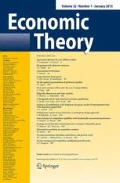Abstract
This paper analyzes a procurement setting with identical firms and stochastic innovations. In contrast to the previous literature, I show that a procurer who cannot charge entry fees may prefer a fixed-prize tournament to a first-price auction. The reason is that holding an auction may leave higher rents to firms when the innovation technology is subject to large random factors.
Similar content being viewed by others
References
An M.Y. (1998) Logconcavity versus logconvexity: a complete characterization. J Econ Theory 80, 350–369
Arozamena L., Cantillon E. (2004) Investment incentives in procurement auctions. Rev Econ Stud 71: 1–18
Bagnoli M., Bergstrom T. (2005) Log-concave probability and its applications. Econ Theory 26, 445–469
Baye M.R., Kovenock D., de Vries C.G. (1996) The all-pay auction with complete information. Econ Theory 8, 291–305
Che Y.-K., Gale I. (2003) Optimal design of research contests. Am Econ Rev 93, 646–671
Dasgupta P. (1986) The theory of technological competition. In: Stiglitz J.E., Mathewson G.F. (eds) New Developments in the analysis of market structure. Cambridge, MIT Press, pp. 519–547
Dasgupta P., Stiglitz J. (1980) Uncertainty, industrial structure, and the speed of R&D. Bell J Econ 11, 1–28
Defense advanced research projects agency: DARPA grand challenge. http://www.darpa.mil/ grandchallenge/ (2005)
Fullerton R.L., McAfee R.P. (1999) Auctioning entry into tournaments. J Political Econ 107, 573–605
Fullerton R.L., Linster B.G., McKee M., Slate S. (1999) An experimental investigation of research tournaments. Econ Inq 37, 624–636
Fullerton R.L., Linster B.G., McKee M., Slate S. (2002) Using auctions to reward tournament winners: Theory and experimental investigations. RAND J Econ 33, 62–84
Green J.R., Stokey N.L. (1983) A comparison of tournaments and contracts. J Political Econ 91, 349–364
Grund C., Sliwka D. (2005) Envy and compassion in tournaments. J Econ Manag Strategy 14, 187–207
Hvide H.K. (2002) Tournament rewards and risk taking. J Labor Econ 20, 877–898
InnoCentive About InnoCentive. http://www.innocentive.com/about/ (2005)
Kräkel M., Sliwka D. (2004) Risk taking in asymmetric tournaments. Ger Econ Rev 5, 103–116
Krishna V.: Auction Theory. New York Academic (2002)
Lazear E.P., Rosen S. (1981) Rank-order tournaments as optimum labor contracts. J Pol Econ 89, 841–864
Lebrun B. (1998) Comparative statics in first price auctions. Games Econ Behav 25, 97–110
Lee T., Wilde L.L. (1980) Market structure and innovation: a reformulation. Q J Econ 94, 429–436
Loury G.C. (1979) Market structure and innovation. Q J Econ 93, 395–410
Malcomson J.M. (1984) Work incentives, hierarchy, and internal labor markets. J Pol Econ 92, 486–507
Maskin E., Riley J. (2000) Asymmetric auctions. Rev Econ Stud 67, 413–438
Maurer S.M., Scotchmer S.: Procuring knowledge. In: Intellectual property and entrepreneurship, vol. 15 of advances in the study of entrepreneurship, innovation, and economic growth, pp. 1–31. Amsterdam: Elsevier (2004)
McLaughlin K.J. (1988) Aspects of tournament models: a survey. Res Labor Econ 9, 225–256
Nalebuff B., Stiglitz J. (1983) Prizes and incentives: towards a general theory of compensation and competition. Bell J Econ 14, 21–43
O’Keefe, M., Viscusi W.K., Zeckhauser R.J. (1984) Economic contests: comparative reward schemes. J Labor Econ 2, 27–56
Rosen S. (1986) Prizes and incentives in elimination tournaments. Am Econ Rev 76, 701–715
Sukhatme P.V. (1937) Tests of significance for samples of the χ2-population with two degrees of freedom. Ann Eugen 8, 52–56
Taylor C.R. (1995) Digging for golden carrots: an analysis of research tournaments. Am Econ Rev 85, 872–890
Windham P.H.: A taxonomy of technology prizes and contests. In: Concerning federally sponsored inducement prizes in engineering and science, pp. 21–34. National Academies Press. http://www.nap.edu/ (1999)
Author information
Authors and Affiliations
Corresponding author
Additional information
I would like to thank Dominique Demougin and Carsten Helm for helpful comments and discussions. Financial support by the Deutsche Forschungsgemeinschaft through the SFB 649 “Economic Risk” is gratefully acknowledged.
Rights and permissions
About this article
Cite this article
Schöttner, A. Fixed-prize tournaments versus first-price auctions in innovation contests. Economic Theory 35, 57–71 (2008). https://doi.org/10.1007/s00199-007-0208-9
Received:
Revised:
Published:
Issue Date:
DOI: https://doi.org/10.1007/s00199-007-0208-9



